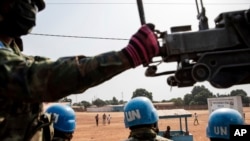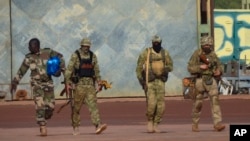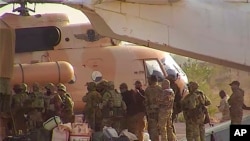Russia has been intensifying its efforts to project power on the African continent, partly by increasing military deployment and ramping up its propaganda campaign.
CAR recently agreed to host a Russian military base and the two countries are discussing where it will be located, Russian ambassador to CAR Alexander Bikantov told Russia’s state-owned TASS news agency on March 26.
TASS cited CAR presidential adviser Fidele Gouandjika as saying that that infrastructure facilities in Berengo, 80 kilometers west of the country’s capital, Bangui, were capable of housing up to 10,000 troops.
In January, TASS quoted Gouandjika as saying the government had already provided a plot of land in Berengo, a place 80 kilometers west of the country’s capital, Bangui, for a Russian base.
In 2019, CNN reported that mercenaries from Russia’s Wagner private military company were headquartered in Berengo “on the grounds of a now dilapidated former presidential palace.”
On March 20, Sputnik Africa, a Russian state-owned news agency, quoted Simplice Sarandji, the President of the Central African National Assembly, as saying that thanks to Russian security support, "peace returns to the Central African Republic.”
That is misleading.
The hostilities in CAR are ongoing, with some 10,000 children fighting in armed conflicts among various rebel groups. Russia’s involvement with CAR’s leadership is replete with corruption, misappropriation of natural resources, mass violence and human rights abuses.
In February, CAR’s Ministry of Family and Gender estimated that armed groups continue to exploit some 10,000 children “recruited as fighters, spies, messengers, cooks and even used as sex slaves.’’
Since Russia deployed Wagner mercenaries to CAR in 2018, Russian officials have misleadingly referred to them as “Russian instructors.”
Russia has designed a disinformation and propaganda ecosystem targeting the African continent to advance Moscow’s interests, the U.S. State Department said in a February 8 report titled “The Wagner Group’s Atrocities in Africa: Lies and Truth.”
“Wagner Group forces have reportedly razed entire villages and murdered civilians in the Central African Republic to advance their economic interests in the mining sector, participated in the unlawful execution of people in Mali, raided artisanal gold mines in Sudan, and undermined democratic institutions in every country where they have worked,” the report said.
Analysts, investigative journalists and rights watchdogs echo the State Department’s assessment of Russia’s corrosive activities in CAR and other African countries
"Russian actions in Africa seek to destabilize the continent. Moscow is conducting a neo-imperialist campaign that belies its endless propaganda claims of anti-colonialism. With military bases and troop deployments in Africa, the Kremlin intends to change the regional and international order for its benefit," Stephen Blank, a senior fellow at the Foreign Policy Research Institute, wrote in a March 18 analysis published by the Jamestown Foundation, a Washington, D.C. think tank.
In December 2022, a joint investigation by Belgian newspaper De Standaard, the media network European Investigative Collaborations (EIC), and the All Eyes on Wagner project concluded that “in exchange for military support to the government in the CAR, the Russian Wagner Group gets access to precious raw materials.”
On March 8, the U.S. imposed sanctions on Bois Rouge SARLU, a CAR-based timber company, for its ties to Wagner, and Broker Expert, a company based in St. Petersburg, Russia, for its support of Bois Rouge.
According to the U.S Treasury Department, the two entities sought to benefit financially "from illicit natural resource extraction and provided material and financial support to the Wagner Group and other organizations" tied to Wagner.
In February, the International Crisis Group reported that despite the CAR army’s efforts, the security situation in the country remains precarious, with armed skirmishes, kidnappings, burning of houses and seizure of properties and killing of civilians regularly occurring throughout the country.
Apart from propagating a positive image of Russia’s role in the region, the Kremlin is providing significant financial support to local actors to intensify its anti-U.S. propaganda and disinformation, including by organizing protest rallies, like an anti-U.S. caravan held in CAR’s capital Bangui on February 26, the International Crisis Group said.
The Human Rights Foundation, HRF, a multinational rights watchdog, reported last August that Russian activities in CAR “have exacerbated long-running lawlessness, corruption, violence, and human rights abuses with total impunity’’ after President Faustin-Archange Touadera in December 2017 ‘’turned to the Kremlin to supply light weaponry to the country’s shambolic military, which was embroiled in a protracted [fight] against rebel groups.’’
HRF wrote: ‘’From advising Touadera to operating commercial businesses and concessions in brewery, forestry, and mining to cultivating pro-Kremlin and anti-Western views in public opinion, operatives linked to [Russian President] Vladimir Putin’s regime have achieved an unmatched level of influence in the country’s affairs.”
On January 15, a U.N. peacekeeper was killed and five others injured in an explosion in CAR’s Ouham-Pende Prefecture. Despite peace efforts and deployments of U.N.-mandated peacekeeping forces, the CAR government still does not control large parts of the country, where rebel groups establish their own rules and operate with impunity.
Over the past two years, the U.S. has provided more than $300 million of humanitarian, development and security assistance in support of finding long-term stability and peace for the people of CAR.








